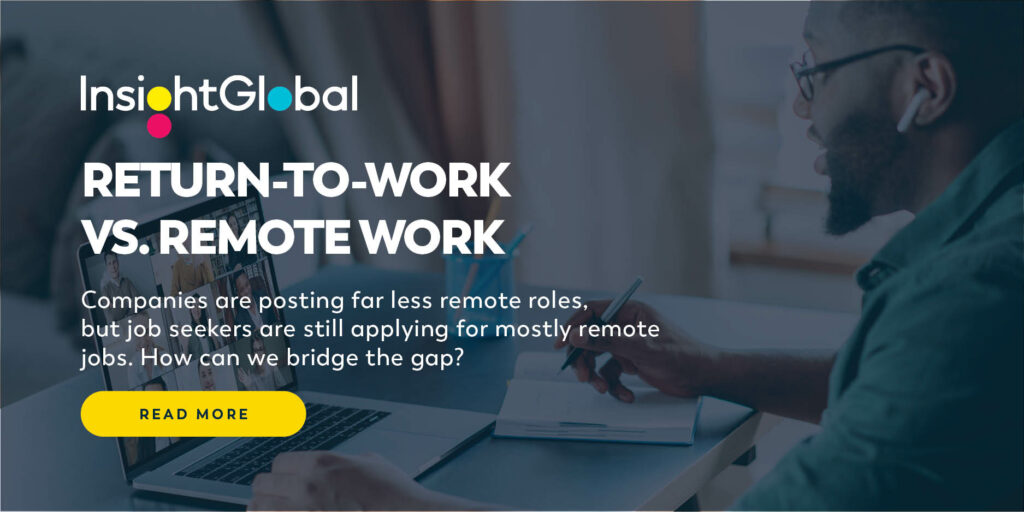According to a recent report from Buffer, 97.6% of workers said they want to work remotely, at least some of the time, for the rest of their career.
Though many companies continue to shift back from fully remote to hybrid work models, the hiring process can still involve a lot of remote work. But before you onboard remote employees and eventually manage them, you need to master remote hiring as well as remote interviewing.
In this post, you’ll learn the benefits of remote hiring and interviewing, how to refine your remote hiring and remote interview processes, and most importantly, how to make the best hires. Let’s dive in!
Differences Between In-Person and Remote Hiring & Interviewing
Let’s face it. Interviewing someone through a screen is not the same as having an in-person conversation. There are many differences between these two methods of communication, and hiring managers should be aware of this when conducting interviews for remote positions.
Let’s break down some of these differences so you know what to expect.
Small Talk
A significant difference you’ll notice is small talk at the beginning of the interview. It’s critical that you spend time at the beginning of the interview to gel with your candidate, but this may not come naturally in a remote interview. Make sure you’re taking time to ask about your candidates’ interests and chat about something other than work.
Remember that building rapport is more than just asking about hobbies. It’s about being personable with your potential hires and making a good impression.
Listening Skills
Another significant difference between remote interviews and traditional in-person ones is listening skills. An interviewee cannot rely on someone’s full body language to signal that it’s time to move onto the next question, nor can they lean forward to indicate interest.
A great way to combat this issue is making your candidates feel heard by not interjecting during their responses. Interrupting is one of the quickest ways to foul up a remote interview and prevent your candidate from doing well.
Staying Engaged
You must work extra hard to keep your candidates engaged during a remote interview because applicants may experience distractions that interfere with their ability to focus. This could be in the form of pets, children, a rowdy neighbor, or anything else. Here are some ideas for keeping your interviewee on track:
- Keep your candidates talking about themselves. Ask more questions than you answer and avoid talking too much about yourself.
- Focus on building rapport. Don’t just read off a list of questions to your candidate and call it a day. Try to have a real conversation with them instead!
- Try to keep the interview shorter than an hour. Remote interviews tend to be uncomfortable for both parties if they last too long. You run the risk of losing your candidate’s attention by asking unnecessary questions just to fill time.
These are just a few ways managers can make the best of virtual interviews, but the most important is to recognize that they are inherently different than in-person ones. Employers need to keep these differences in mind when hiring remote employees, and candidates must be prepared for them as well.
Benefits of Remote Hiring & Remote Interviewing
Remote hiring and interviewing can offer a number of benefits to your company. And businesses that aren’t utilizing remote interviews are missing out on countless talented employees who may not otherwise be in the running. Here are some of the benefits of shifting to remote hiring and interviewing:
Lower Costs
This may seem like a no-brainer, but it’s actually very important. When you conduct a remote interview, you can usually do them from anywhere. If you’re interviewing candidates from across the country, you don’t have to fly them out and pay for hotel accommodations. When it comes to hiring, you can also save on relocation costs and other expenses that may come from having every employee in-person.
Access to Talented People
There are talented people—people who could be a perfect fit for your company—scattered all over the country and globe. By interviewing and hiring remote employees, you’re gaining access to a larger talent pool, increasing your chances of finding great people.
Fast Hiring
Remote interviews can help you hire employees faster. Interviews that are conducted over the phone or through video take less time than those done face-to-face, and there’s no need for both you and your candidate to meet at a central location.
Plus, video interviews are typically recorded. This means you can go back and reference them as needed. You won’t forget any answers people gave during their interview because it will be right there on-screen for you to access as necessary.

Remote Hiring Process
Remote hiring is when businesses use technology to recruit employees without being limited in location or the number of applicants they see. Let’s review the process from start to finish so you can learn how to set up a seamless system that helps you recruit the best possible employees.
Creating a Job Post for a Remote Position
A job post needs to be clear for both applicants and hiring managers. You want your candidates to know what the role entails, the qualifications you’re looking for, and where they can go to access more information about the company.
Be sure to include information about company expectations, as well as the day-to-day tasks they will be expected to complete. Here are some specific things you’ll want to mention in your job post:
- The work schedule and how many hours per week they will need to work.
- Does your company use Slack or any other business communication tool? It’s important to outline this in the job description because it will give applicants a good idea of what platforms they should be familiar with.
- Information on what equipment they need. Do they need their own computer, or will the company provide them with one? Does your company provide a home office setup stipend? These are questions candidates want to know prior to the interview.
- Any other qualifications or requirements for the job. Is there a specific certification you are looking for? What about previous experience? It’s important that you are clear about what qualifications or requirements your ideal candidate would need in order to do the job.
Remember that clarity is important in your job posting. You want to be able to attract candidates that are interested, but also ensure they know exactly what is expected of them once they start working for you.
Promoting Your Remote Position
Promoting your remote position is an important aspect of the remote hiring process. If you promote your position in the wrong place, the quality of applications you receive could be low. Working with a staffing agency is a great way to ensure your job opening gets posted on all the right platforms.
Stay Organized During the Application Process
Once you’ve created and promoted your remote job posting, it’s time to move on to the application process—and the application process can be overwhelming. Between the forms, deadlines, and countless documents that need to be filled out, your days may become consumed with resumes. That’s why it’s important to manage your time effectively during this process, but that’s not always easy. Follow these organizational tips to ensure you stay on top of your to-do list:
- Create a detailed spreadsheet or table in which you can list all your deadlines, important dates (i.e., remote interviews), and the number of days required to complete each task.
- Keep track of all forms and documents required for the application process. You may want to use a calendar or an online document storage site (i.e., Google Drive or Dropbox)
Remote Interview Process
Nowadays it seems like nearly everyone has a detailed schedule and is crunched for time. That’s why it’s important to create a positive and efficient remote interviewing process from start to finish. Here’s how you prepare:
Setting Up the Interview
When managers and HR professionals implement a virtual interviewing system, they can begin building their pool of potential new hires. Here are some key features to consider when setting up the interview:
- Coordinate a time that works for both you and the candidate. Because you’re hiring for a remote position, you may be interviewing candidates who live in different time zones. Be sure to schedule a time that’s convenient for both parties.
- Make sure you have a good internet connection. The last thing you want is to run into technical difficulties right before the interview.
- Find a quiet area. You don’t want your interviewee to get distracted by your environment. The background should be professional and organized.
- Record the interview. This allows you to refer to it later and makes sure both parties have a copy of what was said during the call.
Ask the Right Questions
Once you’ve gone through your setup checklist, you’ll need to prepare some interview questions that are relevant to remote jobs. We recommend asking at least a few of the below questions:
- Have you worked remotely in your previous roles? What did you like/dislike about it?
- How do you keep yourself focused during work hours when working from home?
- Are there any challenges you expect to face while working remotely?
- What do you need in your at-home workspace to be successful in your role?
- Do you have any concerns or weaknesses about working remotely?
- What interests you about working at the company?
Establishing the Next Steps
Sending a follow up email after a remote interview is a great way to confirm the next steps in the process and continue building rapport with your candidate. It’s also a good idea to let the candidate know that they can reach out if they have any additional questions.
We Can Help You Hire Top Talent
Don’t have time to employ all the strategies and practices mentioned in this post? Let us do the hard work for you!
We can help you get instantly connected with top talent—and we do more than just interview your candidates. We handle the entire remote hiring process from start to finish: candidate search, onboarding, and even payroll.
If this sounds like something you’re interested in, head over to our hiring page and we’ll help you find amazing remote talent.


 by Anna Morelock
by Anna Morelock




 by Alexandra Woodford
by Alexandra Woodford 
 by Brita Long
by Brita Long 
